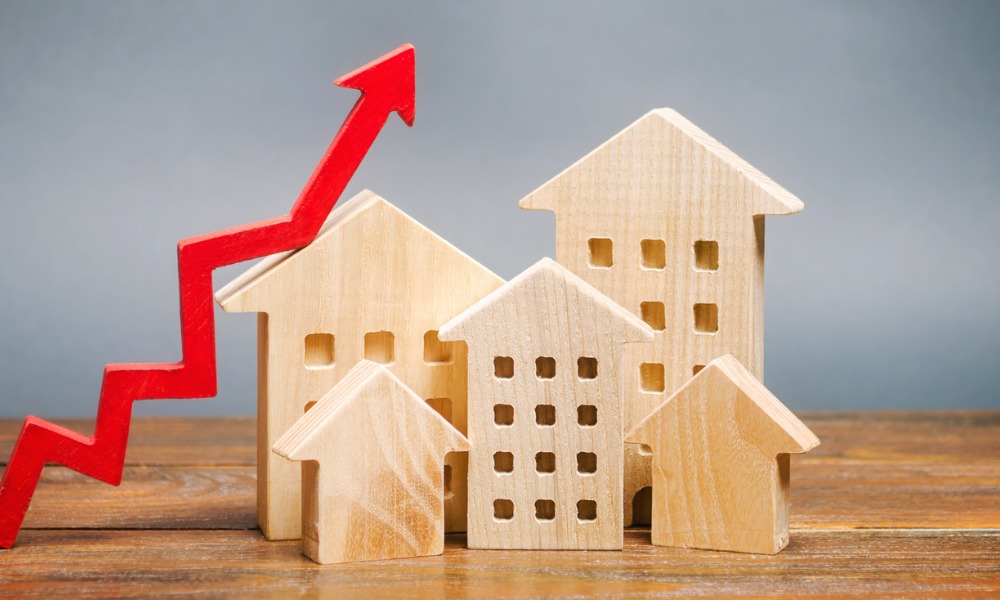Fastest increase in six years as capital's appeal attracts buyers

The surge in property prices continued apace in March despite the cost-of-living crisis, with homes in London rising at their fastest rate since 2016, according to the Nationwide Building Society.
During the first quarter, house prices in the capital saw an annual rate increase of 7.4%, up from 4.8% compared with the same period last year – despite three successive interest rate increases, the latest of which was last month, lifting it to 0.75%.
The lack of supply and high demand for London properties as people returned to work in offices, in addition to the capital’s attractions, were cited as the main reasons.
Average prices for a London home have now risen by £41,351, an 8.4% increase since March 2020, meaning that the average house price in the capital stands at £534,977. The annual average asking price has also increased by more than 6%.
The figures are notable because they buck a trend that was set during the COVID pandemic. Although the crisis led to a housing boom across the UK, demand in London remained low, as buyers began looking for homes further afield as they were no longer constrained by having to travel to their workplaces.
Read next: “Trust your instincts” – MD on bold move
Cornerstone Tax, one of the country’s leading property tax advisers, issued a statement saying that only an increase in supply would slow down the rise of UK house prices.
It, however, added that with more than double the amount of buyers to sellers currently active in the market, it was not possible to know how quickly balance between supply and demand would be achieved.
James Morley, business development director at Cornerstone Tax, said factors such as the stamp duty holiday caused more people to consider buying property, but that due to the increase in average house prices, it had made it “more difficult than ever” for buyers to purchase their first property.
However, having record high property prices could also work as an incentive for owners to sell, he added.
“There is hope that more available properties will enter the UK housing market - thus causing a more manageable supply and demand level and subsequently halting the rapid rise of property prices. I think homeowners will look to take advantage of the record house prices and look to maximise the prices they can get if they sell their property, causing an increase in supply for the UK property market.
“A solution to the global supply issues will cause an increased supply of new builds, providing the UK housing market with some much-needed extra stock, which should subsequently decrease the average UK house prices, but there are many obstacles facing the UK housing market now which has caused a lot of uncertainty.”
Speaking to Mortgage Introducer, Alison Pallett, LiveMore Capital’s managing director of sales, said the lack of supply “could be a worry for all of us, whatever the age”.
Asked if the increase in London house prices was a new trend or a blip, she said: “That’s a tricky one to say, but the law of supply and demand probably tells us this could be a sign of strong demand.
“However, the counterbalance to all this is the likelihood of further rises in interest rates and the cost-of-living. All told, this could lead to a more normal market position later in the year as these increases begin to bite.”
Read more: UK house prices – Halifax reveals the latest
A report in the Financial Times quoted Angus Dixon, director of private clients at property consultants INHOUS, who echoed the view that the supply and demand imbalance across London had driven pricing.
In the same article, Emma Cox, managing director of real estate at Shawbrook Bank, explained the renewed appeal of London, noting that the capital’s hotspots were once again “fast becoming an attractive place to be”, a view shared by other property experts interviewed by the publication, which also revealed that the most expensive properties were showing the strongest activity.
But despite the recovery, London still lags behind other regions in the UK while foreign buyers are conspicuous by their absence, according to one observer.
Moreover, according to a recent report by US credit rating agency S&P Global Ratings, London’s property market is “overvalued” by as much as 50%.
Quoted in The Daily Telegraph, researcher Alastair Bigley said a combination of low rates, a stamp duty holiday and excess equity had driven property prices higher, particularly in London and the South East, warning that prices were likely to fall.



